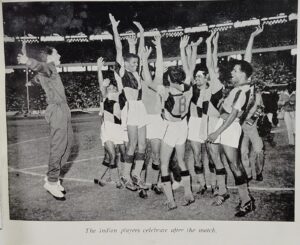
It was quite an emotional moment for the family of Arun Ghosh, one of the handful still alive from the 1962 Asian Games-winning Indian football team. The 82-year-old Ghosh, who still resides in the narrow lanes of a dusty Shalimar Char Mandir was present for the screening of the Ajay Devgan starrer, Maidaan, at the Avani Mall on Sunday, April 7. The film portrays the legendary football coach Syed Abdul Rahim, who was affectionately known as Rahim Saheb. As you enter the living room of the two-storied building, your eyes are drawn towards a particular picture on the wall. It was the Indian team during the 1960 Olympics in Rome, and a young Ghosh can be seen alongside legends like PK Banerjee, Chuni Goswami, Tulsidas Balaram, Jarnail Singh and others.
“My father’s first meeting with Rahim Saheb was in 1960 during the Durand Cup,” said Sugata Santra, Ghosh’s elder daughter. “He was playing for Mohun Bagan then. Rahim Saheb was at the Ambedkar stadium, watching my father play. After the match, he (Rahim Saheb) met him and said: ‘Beta, tum India ke liye kheloge [Son, you’ll play for India]?’ He was picked in the Indian team after that,.”
All these years later, Ghosh himself is clear. “Rahim Saheb was like a God to us,” he tells you.
The veteran footballer has been suffering from Alzheimer’s since the days of Covid-19. The only time he left his house was when he had to go to hospital. On Sunday, Ghosh was at the screening of the film along with DMK Afzal, his 1962 teammate who flew into Kolkata from Hyderabad.
For the Latest Sports News: Click Here
“Maidaan acted as a medicine for my father,” says 1962 Asian Games winning football team member Arun Ghosh’s daughter!@lalbabarice @ajaydevgn #PriyamaniRaj @raogajraj @BoneyKapoor @ZeeStudios_ @iAmitRSharma @arrahman @manojmuntashir @BayViewProjOffl @freshlimefilms @SaiwynQ… pic.twitter.com/7MSeFX3zbJ
— RevSportz (@RevSportz) April 11, 2024
“Baba is not doing well these days, as you can see,” said Sugata. “He is suffering from Alzheimer’s. But he was there for at least four hours without any complaint. It was a pleasant surprise for us. While watching the film, he went back to 1962. He enjoyed the entire movie. Maidaan acted as a medicine for my father. He could recall his old memories.
“He does not go out too often because of his heath issues. Both me and my younger sister were watching the screening with him. During one scene, we told Baba: ‘See, there is Jarnail uncle (Jarnail Singh)’, and he reacted immediately.”
Rahim is considered the man who transformed Indian football during the 1950s and early 1960s. Under his coaching, the team finished fourth at the 1956 Melbourne Olympics. Despite putting up stellar performances against Hungary and France at the 1960 Olympics in Rome, India were knocked out. However, Arthur Drewry, the FIFA President, lauded the team’s performance by saying they were the ‘Brazil of Asia’.
“It was always a regret for my father, and he keeps saying to us that had Rahim Saheb lived for a few more years, India could have won an Olympic medal which we missed at the Melbourne Games in 1956,” said Sugata. “Rahim Saheb was a fatherly figure to each member of that team. He was like a God to them.

“He (Rahim Saheb) was very strict, but at the same time, he loved each member of the team. My father was the youngest member of that team, he was only 19 years old then. He used to care for him. Rahim Saheb used to be a chain-smoker, and my father caught this habit watching him,” adds Sugata with a laugh.
There are some factual tweaks in the film. For instance, India were two goals ahead in the final against South Korea. But the movie shows Chuni Goswami and his boys trailing by a goal late in the game. But the family of Ghosh has no problem with that.
Rahim passed away nine months after the gold medal-winning feat in Jakarta. On being asked if the players knew about his illness, Sugata said, “My father did share it with us several times that a day before the match, Rahim Saheb said to the players that he did not have much time and he wanted to win the medal.”
Most members of that victorious Asian Games team are no more with us. They would have been proud to watch Maidaan, which brings to life what remains the high watermark of Indian football. Kudos to the producer and director for making a film on that golden era.
Also Read: The Abolition of the Away-Goals Rule: A Balanced Decision?